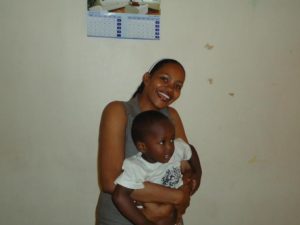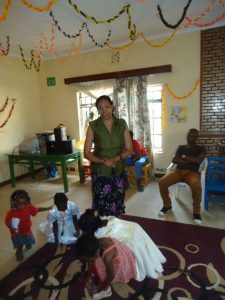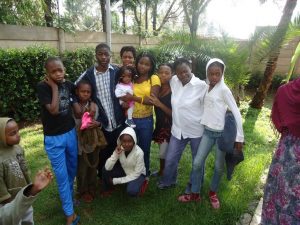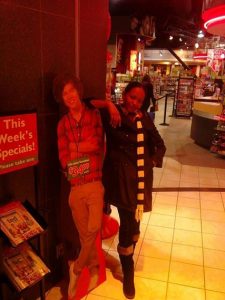10 Caitlyn Grebner
Narrative Summary
Here in the United States people often take for granted our daily abilities. The majority of people here can speak english, apply for loans, get access to medical care, go to school, speak our minds, etc. Taking the time to learn about the ways people live and reasons people leave their countries can be extremely eye opening to what the world is like. For most people, especially white people in the United States it’s not until some of us go to college that we learn what the world is really like and how humans are treated poorly.
I had the privilege of interviewing Rania Seliman Mohammed. Rania was born and raised in the capital of Sudan, Khartoum. All here primary education was completed in Sudan. For her secondary education she had about three years studying mechanical engineering. In addition to being deep in her studies she joined female groups focused on gender issues. The war started in 2003 and students were being targeted by the dictatorship regime. In 2010, Rania attended a Human Rights defender workshop in Uganda, Kampala. From there she was able to go to Nairobi, Kenya for about two-to-three weeks to help complete a leader workshop on how to be politically active with the dictatorship regime in power. When she arrived back in Sudan she was arrested and investigated on what she had been doing in Kampala and Nairobi. About 15 days later her home was attacks, they claimed they were looking for papers on what they were working on. A week later she was arrested for another week as they investigated her. They believed they were working with other activists out of Sudan. It was at this point Rania and her ex husband decided to leave Sudan.
and raised in the capital of Sudan, Khartoum. All here primary education was completed in Sudan. For her secondary education she had about three years studying mechanical engineering. In addition to being deep in her studies she joined female groups focused on gender issues. The war started in 2003 and students were being targeted by the dictatorship regime. In 2010, Rania attended a Human Rights defender workshop in Uganda, Kampala. From there she was able to go to Nairobi, Kenya for about two-to-three weeks to help complete a leader workshop on how to be politically active with the dictatorship regime in power. When she arrived back in Sudan she was arrested and investigated on what she had been doing in Kampala and Nairobi. About 15 days later her home was attacks, they claimed they were looking for papers on what they were working on. A week later she was arrested for another week as they investigated her. They believed they were working with other activists out of Sudan. It was at this point Rania and her ex husband decided to leave Sudan.
 and raised in the capital of Sudan, Khartoum. All here primary education was completed in Sudan. For her secondary education she had about three years studying mechanical engineering. In addition to being deep in her studies she joined female groups focused on gender issues. The war started in 2003 and students were being targeted by the dictatorship regime. In 2010, Rania attended a Human Rights defender workshop in Uganda, Kampala. From there she was able to go to Nairobi, Kenya for about two-to-three weeks to help complete a leader workshop on how to be politically active with the dictatorship regime in power. When she arrived back in Sudan she was arrested and investigated on what she had been doing in Kampala and Nairobi. About 15 days later her home was attacks, they claimed they were looking for papers on what they were working on. A week later she was arrested for another week as they investigated her. They believed they were working with other activists out of Sudan. It was at this point Rania and her ex husband decided to leave Sudan.
and raised in the capital of Sudan, Khartoum. All here primary education was completed in Sudan. For her secondary education she had about three years studying mechanical engineering. In addition to being deep in her studies she joined female groups focused on gender issues. The war started in 2003 and students were being targeted by the dictatorship regime. In 2010, Rania attended a Human Rights defender workshop in Uganda, Kampala. From there she was able to go to Nairobi, Kenya for about two-to-three weeks to help complete a leader workshop on how to be politically active with the dictatorship regime in power. When she arrived back in Sudan she was arrested and investigated on what she had been doing in Kampala and Nairobi. About 15 days later her home was attacks, they claimed they were looking for papers on what they were working on. A week later she was arrested for another week as they investigated her. They believed they were working with other activists out of Sudan. It was at this point Rania and her ex husband decided to leave Sudan.Rania was able to leave in December of 2010 and she stayed with her friend Nadia, before her ex-husband was able to come. She left with only photos, a passport, toothbrush, and a small bag with little to no clothing. Rania applied for protection housing with the United Nations High Commissioner for Refugees and got refugee status. She was given protected housing in Nairobi Kenya for two years. It was at this point when Rania reflected on her life and experiences and considers herself a lucky refugee, because she saw many people coming from war zones. At the end of 2012 Rania came to the United States, but like the majority of refugees, for about a year and a half she didn’t know where she would end up.
Rania wasn’t able to bring many possessions with her when she left. However, she has kept ahold of some photographs from her time as a refugee. Three of the four photos are from her in the protection camp. She worked as a coordinator for the refugee committee within the camp. One photo has her introducing a Refugee’s Day program. Another photo has Rania and a little Burundian boy named Cruise playing around. Rania has informed me that Cruise is now living in Canada. A third photo doesn’t have Rania in it, but is a photo of a group of children from different countries. Some of them were from Somalia, Rwanda, Burundi, Ethiopia, and Democratic Republic of the Congo.
committee within the camp. One photo has her introducing a Refugee’s Day program. Another photo has Rania and a little Burundian boy named Cruise playing around. Rania has informed me that Cruise is now living in Canada. A third photo doesn’t have Rania in it, but is a photo of a group of children from different countries. Some of them were from Somalia, Rwanda, Burundi, Ethiopia, and Democratic Republic of the Congo.
 committee within the camp. One photo has her introducing a Refugee’s Day program. Another photo has Rania and a little Burundian boy named Cruise playing around. Rania has informed me that Cruise is now living in Canada. A third photo doesn’t have Rania in it, but is a photo of a group of children from different countries. Some of them were from Somalia, Rwanda, Burundi, Ethiopia, and Democratic Republic of the Congo.
committee within the camp. One photo has her introducing a Refugee’s Day program. Another photo has Rania and a little Burundian boy named Cruise playing around. Rania has informed me that Cruise is now living in Canada. A third photo doesn’t have Rania in it, but is a photo of a group of children from different countries. Some of them were from Somalia, Rwanda, Burundi, Ethiopia, and Democratic Republic of the Congo.These children have all been resettled in different countries. The last photo Rania provided me with is a photo of herself having just arrived in the United States.
When Rania came to the United States she was living in Michigan for about six months. From a friend she heard about Iowa City and how there is a Sudanese community and there’s the opportunity for education. In 2014 Rania got her green card and within the last year she was granted citizenship in the United States. She notes her process went very smoothly, because she had been used to the system and there was no reason for her to be denied citizenship. Reflecting on Sudan Rania members and misses her friends, her life, her family, and the sense of comfortability. She recognizes she’s fortunate enough to have family that visits, but it’s still hard to not have you family in the same country. She longs for the comfort of being in Sudan surrounded by a Sudanese community. Rania wants justice for the people hurt by the regime. She recognizes the people who were tortured, killed, raped, etc and they deserve justice. Rania also has a beautiful little six year old girl named Wanja. Being an adjusting refugee and raising a little girl as a single mother is extremely difficult. Rania credits preschools in Iowa for helping her out over the years with not only childcare, but also with basic information children learn in preschool. It’s also important to note that Rania doesn’t have her relatives around her to
she’s fortunate enough to have family that visits, but it’s still hard to not have you family in the same country. She longs for the comfort of being in Sudan surrounded by a Sudanese community. Rania wants justice for the people hurt by the regime. She recognizes the people who were tortured, killed, raped, etc and they deserve justice. Rania also has a beautiful little six year old girl named Wanja. Being an adjusting refugee and raising a little girl as a single mother is extremely difficult. Rania credits preschools in Iowa for helping her out over the years with not only childcare, but also with basic information children learn in preschool. It’s also important to note that Rania doesn’t have her relatives around her to  help with childcare. Rania is a current student at the University of Iowa. She is majoring in International Studies on a Human Rights track. This also happens to be her last semester as she’s graduating in December 2019.
help with childcare. Rania is a current student at the University of Iowa. She is majoring in International Studies on a Human Rights track. This also happens to be her last semester as she’s graduating in December 2019.
 she’s fortunate enough to have family that visits, but it’s still hard to not have you family in the same country. She longs for the comfort of being in Sudan surrounded by a Sudanese community. Rania wants justice for the people hurt by the regime. She recognizes the people who were tortured, killed, raped, etc and they deserve justice. Rania also has a beautiful little six year old girl named Wanja. Being an adjusting refugee and raising a little girl as a single mother is extremely difficult. Rania credits preschools in Iowa for helping her out over the years with not only childcare, but also with basic information children learn in preschool. It’s also important to note that Rania doesn’t have her relatives around her to
she’s fortunate enough to have family that visits, but it’s still hard to not have you family in the same country. She longs for the comfort of being in Sudan surrounded by a Sudanese community. Rania wants justice for the people hurt by the regime. She recognizes the people who were tortured, killed, raped, etc and they deserve justice. Rania also has a beautiful little six year old girl named Wanja. Being an adjusting refugee and raising a little girl as a single mother is extremely difficult. Rania credits preschools in Iowa for helping her out over the years with not only childcare, but also with basic information children learn in preschool. It’s also important to note that Rania doesn’t have her relatives around her to  help with childcare. Rania is a current student at the University of Iowa. She is majoring in International Studies on a Human Rights track. This also happens to be her last semester as she’s graduating in December 2019.
help with childcare. Rania is a current student at the University of Iowa. She is majoring in International Studies on a Human Rights track. This also happens to be her last semester as she’s graduating in December 2019.Rania is a superwoman and deserves the world! She is completing school while raising her daughter by herself. That’s important because most women now in the United States aren’t able to do that. Rania wants a better future for her daughter and she’s making sure of it. I’m honored to have been able to speak with and get to know Rania more. Other people’s experiences open your eyes to what we have and how we can make other people’s lives better.
Personal Reflection
As a white woman entering adulthood I have become very aware of my privilege. Privilege wasn’t something talked about in my household growing up. As I’ve grown and been exposed to the world I’ve realized that while I’ve experience hardships in life there are millions of people (especially women and children of color) that have little and they also may have to work extremely hard just to get by. I got to college and dove into research about the different lives that people live and how different experiences affect us. I became a Political Science Major, I added a Minor in Gender, Women, and Sexuality Studies, and a Certificate in Human Rights. Looking to the future I ultimately want to help women and children of color hopefully in their resettlement process.
For my interview I was able to talk with Rania Seliman Mohammed. She was a refugee from Sudan and is now a United States Citizen. I was fortunate enough to be able to interview her in her home. I felt Rania showed her vulnerable side, allowing myself to come into her home to then ask her questions about her experiences as a refugee. I felt very humbled and welcomed in her home which made our conversation feel like it was only twenty minutes when in reality we had been talking for about an hour. Rania’s home was warm and she had big beautiful butterfly’s hanging on the wall. Her beautiful daughter peaked around the corner as we sat down and was shy, but I love children and the energy they bring into spaces.
In my research and question forming process prior to the interview, I was nervous about not asking the right questions or asking something that would make her feel uncomfortable. I wanted to make sure I was asking good questions as I didn’t want to waste her time and I really was wanting to learn more about her story and her journey as a refugee. In addition, I’m an emotional person and I was worried about how her story may affect myself, because I didn’t want to take away from her time and her platform.
I had four major takeaways from my interview with Rania. Those being: how much your life changes coming the United States, the lack of mental health aid, how poorly education from other countries transfers, and how we take for granted things like preschool. To begin, I think that people take for granted what it means to be adapted to a culture and its norms. For example, Rania and I spoke primarily about how domestic violence is perceived very differently in Sudan versus the United States. My second take away was the realization of how far the lack of mental healthcare reaches. I know how hard it is for me to get access to mental healthcare, but never mind the trauma people are bringing with them and on top of that they’re trying to assimilate to a new country. My third take away was that has baffled my mind all semester is that the education people get in other countries doesn’t always transfer equally to another country. Rania had been studying mechanical engineering in Sudan and is now majoring in International Studies on a Human Rights track. My last take away was that Rania is grateful for the preschool systems set up here in the United States. They helped Rania teach her daughter basic information that would be usually taught from family members. Most everyone I know goes to preschool and it’s a lot to sit back and think about the opportunities we receive that others may never get.
I really enjoyed my time speaking with Rania. I’m more than certain she’s excited to be done with school this semester. As well as I hope she knows how amazing she is as a student and single mother. She’s setting up a wonderful future for her daughter and I wish her the best. This interview has opened my eyes even more deeply to what other people, especially refugees, and what they go through often is a short amount of time.
